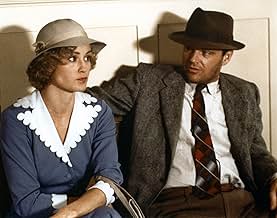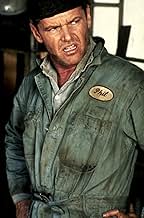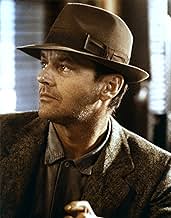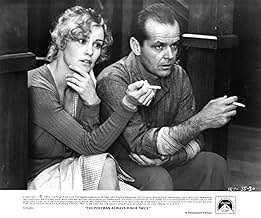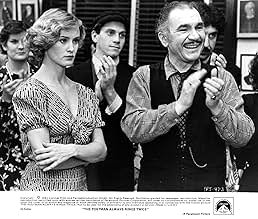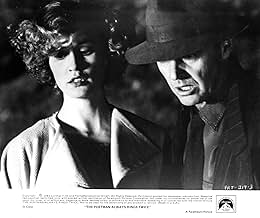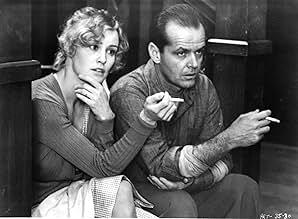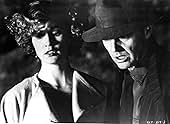The sensuous wife of a roadside diner proprietor and a rootless drifter begin a sordid, steamy affair and conspire to murder her Greek husband.The sensuous wife of a roadside diner proprietor and a rootless drifter begin a sordid, steamy affair and conspire to murder her Greek husband.The sensuous wife of a roadside diner proprietor and a rootless drifter begin a sordid, steamy affair and conspire to murder her Greek husband.
- Awards
- 1 win & 2 nominations total
Thomas Hill
- Barlow
- (as Tom Hill)
- Director
- Writers
- All cast & crew
- Production, box office & more at IMDbPro
Featured reviews
This remake of the 1946 film which starred Lana Turner and John Garfield is significantly better than its reputation. The script, adapted from James M. Cain's first novel, is by the award-winning playwright David Mamet, while the interesting and focused cinematography is by Sven Nykvist, who did so much exquisite work for Swedish director Ingmar Bergman. An excellent cast is led by Jack Nicholson and Jessica Lange, whose cute animal magnetism is well displayed. Bob Rafelson, who has to his directorial credit the acclaimed Five Easy Pieces (1970) and The King of Marvin Gardens (1972), both also starring Jack Nicholson, captures the raw animal sex that made Cain's novel so appealing (and shocking) to a depression-era readership and brings it up to date. Hollywood movies have gotten more violent and scatological since 1981, but they haven't gotten any sexier. This phenomenon is in part due to fears occasioned by the rise of AIDS encouraged by the usual blue stocking people. Don't see this movie if sex offends you.
Lange is indeed sexy and more closely fits the part of a lower-middle class woman who married an older man, a café owner, for security than the stunning blonde bombshell Lana Turner, who was frankly a little too gorgeous for the part. John Colicos plays the café owner, Nick Papadakis, with clear fidelity to Cain's conception. In the 1946 production, the part was played by Cecil Kellaway, who was decidedly English; indeed they changed the character's name to Smith. Also changed in that production was the name of the lawyer Katz (to Keats). One wonders why. My guess is that in those days they were afraid of offending Greeks, on the one hand, and Jews on the other. Here Katz is played by Michael Lerner who really brings the character to life.
Jack Nicholson's interpretation of Cain's antihero, an ex-con who beat up on the hated railway dicks while chasing any skirt that came his way, the kind of guy who acts out his basic desires in an amoral, animalistic way, was not entirely convincing, perhaps because Nicholson seems a little too sophisticated for the part. Yet, his performance may be the sort better judged by a later generation. I have seen him in so many films that I don't feel I can trust my judgment. My sense is that he's done better work, particularly in the two films mentioned above and also in Chinatown (1974), One Flew Over the Cuckoo's Nest (1975) and such later works as The Shining (1980) and Terms of Endearment (1983).
The problem with bringing Postman successfully to the screen is two-fold. One, the underlying psychology, which so strongly appealed to Cain's depression-era readership, is not merely animalistic. More than that it reflects the economic conflict between the established haves, as represented by the greedy lawyers, the well-heeled insurance companies, the implacable court system and the simple-minded cops, and to a lesser degree by property owner Nick Papadakis himself, and the out of work victims of the depression, the have-nots, represented by Frank and Cora (who had to marry for security). Two--and this is where both cinematic productions failed--the film must be extremely fast-paced, almost exaggeratedly so, to properly capture the spirit and sense of the Cain novel. Frank and Cora are rushing headlong into tragedy and oblivion, and the pace of the film must reflect that. A true to the spirit adaptation would require a terse, stream-lined directorial style with an emphasis on blind passions unconsciously acted out, something novelist Cormac McCarthy might accomplish if he directed film. I think that Christopher Nolan, who directed the strikingly original Memento (2000) could do it.
For further background on the novel and some speculation on why it was called "The Postman Always Rings Twice" (Cain's original, apt title was "Bar-B-Que") see my review at Amazon.com.
(Note: Over 500 of my movie reviews are now available in my book "Cut to the Chaise Lounge or I Can't Believe I Swallowed the Remote!" Get it at Amazon!)
Lange is indeed sexy and more closely fits the part of a lower-middle class woman who married an older man, a café owner, for security than the stunning blonde bombshell Lana Turner, who was frankly a little too gorgeous for the part. John Colicos plays the café owner, Nick Papadakis, with clear fidelity to Cain's conception. In the 1946 production, the part was played by Cecil Kellaway, who was decidedly English; indeed they changed the character's name to Smith. Also changed in that production was the name of the lawyer Katz (to Keats). One wonders why. My guess is that in those days they were afraid of offending Greeks, on the one hand, and Jews on the other. Here Katz is played by Michael Lerner who really brings the character to life.
Jack Nicholson's interpretation of Cain's antihero, an ex-con who beat up on the hated railway dicks while chasing any skirt that came his way, the kind of guy who acts out his basic desires in an amoral, animalistic way, was not entirely convincing, perhaps because Nicholson seems a little too sophisticated for the part. Yet, his performance may be the sort better judged by a later generation. I have seen him in so many films that I don't feel I can trust my judgment. My sense is that he's done better work, particularly in the two films mentioned above and also in Chinatown (1974), One Flew Over the Cuckoo's Nest (1975) and such later works as The Shining (1980) and Terms of Endearment (1983).
The problem with bringing Postman successfully to the screen is two-fold. One, the underlying psychology, which so strongly appealed to Cain's depression-era readership, is not merely animalistic. More than that it reflects the economic conflict between the established haves, as represented by the greedy lawyers, the well-heeled insurance companies, the implacable court system and the simple-minded cops, and to a lesser degree by property owner Nick Papadakis himself, and the out of work victims of the depression, the have-nots, represented by Frank and Cora (who had to marry for security). Two--and this is where both cinematic productions failed--the film must be extremely fast-paced, almost exaggeratedly so, to properly capture the spirit and sense of the Cain novel. Frank and Cora are rushing headlong into tragedy and oblivion, and the pace of the film must reflect that. A true to the spirit adaptation would require a terse, stream-lined directorial style with an emphasis on blind passions unconsciously acted out, something novelist Cormac McCarthy might accomplish if he directed film. I think that Christopher Nolan, who directed the strikingly original Memento (2000) could do it.
For further background on the novel and some speculation on why it was called "The Postman Always Rings Twice" (Cain's original, apt title was "Bar-B-Que") see my review at Amazon.com.
(Note: Over 500 of my movie reviews are now available in my book "Cut to the Chaise Lounge or I Can't Believe I Swallowed the Remote!" Get it at Amazon!)
Twice is nice. Hollywood had to try twice to get this story right. Lana Turner was beautiful in the 1946 version, but Jessica Lange was something to kill for opposite Jack Nicholson.
Such raw sensuality would easily persuade a man to lose his very soul. Nicholson's part is certainly unscrupulous to begin with, but in Jessica Lange he finds a confederate with even less scruples. The legal loose ends that dangled in the earlier version are avoided this time with a more plausible chain of events... and the story ends when the story ought to end, instead of being dragged on.
Wonderful character and situation development, intriguing and engaging, even when you know the story. Nice twists of the story from the Lana Turner and Italian ("Ossessione" 1943) versions.
Such raw sensuality would easily persuade a man to lose his very soul. Nicholson's part is certainly unscrupulous to begin with, but in Jessica Lange he finds a confederate with even less scruples. The legal loose ends that dangled in the earlier version are avoided this time with a more plausible chain of events... and the story ends when the story ought to end, instead of being dragged on.
Wonderful character and situation development, intriguing and engaging, even when you know the story. Nice twists of the story from the Lana Turner and Italian ("Ossessione" 1943) versions.
The Postman Always Rings Twice (1981)
** (out of 4)
Considering the talent in front of and behind the camera, there's really no way to look at this adaptation of the James M. Cain novel as anything but a disappointment. In the film, Jack Nicholson plays drifter Frank Chambers who enters the lives of Cora (Jessica Lange) and her much older husband Nick (John Colicos). Soon the drifter and Cora start up a sexual relationship, which leads to them planning the murder of the husband. This here would be the fourth version of the classic story and the second one filmed in America. Unlike the previous versions, director Bob Rafelson didn't have to worry about censors but even so this version isn't nearly as hot as the earlier one with Lana Turner. Outside a rather intense sex scene towards the start of the picture, this thing really never takes off, which is too bad because they've got a terrific cast and some beautiful settings but in the end the film is just flat. I think the first forty- five minutes are the best thing in the film as we see the love triangle set up and there's no question that the director has the look of the era down perfectly. I thought the setting really added a lot of atmosphere but sadly very little else happens. Nicholson was the perfect choice to play a drifter but the screenplay really doesn't give him too much to work with. Lange is clearly the best thing in the movie as she delivers a sexual charge to the thing. Colicos is also extremely good as the husband in a strong supporting performance. What really hurts the film is the second half because the director never really makes us believe or feel anything for the two leads. Are we supposed to hate them for what they've done? Are we supposed to be rooting for them to get away with the murder and live happily ever after? The entire second half of the film features way too many dialogue scenes that lead no where and in the end the "romance" that starts to bloom towards the end just never fully works. The film isn't nearly as bad as its reputation but at the same time there's no question that it's a major disappointment and a bitter feeling takes over when you think about what could have been.
** (out of 4)
Considering the talent in front of and behind the camera, there's really no way to look at this adaptation of the James M. Cain novel as anything but a disappointment. In the film, Jack Nicholson plays drifter Frank Chambers who enters the lives of Cora (Jessica Lange) and her much older husband Nick (John Colicos). Soon the drifter and Cora start up a sexual relationship, which leads to them planning the murder of the husband. This here would be the fourth version of the classic story and the second one filmed in America. Unlike the previous versions, director Bob Rafelson didn't have to worry about censors but even so this version isn't nearly as hot as the earlier one with Lana Turner. Outside a rather intense sex scene towards the start of the picture, this thing really never takes off, which is too bad because they've got a terrific cast and some beautiful settings but in the end the film is just flat. I think the first forty- five minutes are the best thing in the film as we see the love triangle set up and there's no question that the director has the look of the era down perfectly. I thought the setting really added a lot of atmosphere but sadly very little else happens. Nicholson was the perfect choice to play a drifter but the screenplay really doesn't give him too much to work with. Lange is clearly the best thing in the movie as she delivers a sexual charge to the thing. Colicos is also extremely good as the husband in a strong supporting performance. What really hurts the film is the second half because the director never really makes us believe or feel anything for the two leads. Are we supposed to hate them for what they've done? Are we supposed to be rooting for them to get away with the murder and live happily ever after? The entire second half of the film features way too many dialogue scenes that lead no where and in the end the "romance" that starts to bloom towards the end just never fully works. The film isn't nearly as bad as its reputation but at the same time there's no question that it's a major disappointment and a bitter feeling takes over when you think about what could have been.
"The Postman Always Rings Twice" is the second American version of the famous James M. Cain novel and the fourth overall version. In addition, Émile Zola's story "Thérèse Raquin" clearly was more than just the inspiration for Cain, as it's so similar, too similar, to be coincidental. And the Zola novel has been made at least twenty or more times! So in other words, this 1981 film is a version of a story that's been made over and over and over again....to the point where you wonder why they keep making it!
As I watched this 1981 film, I was pleasantly surprised by one thing...it really does stick very closely to the novel. In many, many ways the characters are nothing like the overly sanitized Lana Turner/John Garfield version. Jack Nicholson's version of Frank is far nastier than the drifter played in the 1946 film. He has a prison record and isn't likable in the least. As for Cora, she's a lot kinkier than she was in earlier versions! In fact, in 1946 they simply couldn't have stuck too closely to the novel due to the tough Production Code...which prevented nudity and kinks from being included in films...and Cora really has some kinks in this film! So, at least it is a much more faithful version of the story...albeit still yet one more version of the story. And this leads me to the important question...is it any good? Well, yes and no. The acting and production are pretty good and the story engaging...but it also is familiar (I know I've mentioned this OFTEN already) and the courtroom scene where Jessica Lange has her outburst is absolutely absurdly overacted. Still, not a bad little film.
As I watched this 1981 film, I was pleasantly surprised by one thing...it really does stick very closely to the novel. In many, many ways the characters are nothing like the overly sanitized Lana Turner/John Garfield version. Jack Nicholson's version of Frank is far nastier than the drifter played in the 1946 film. He has a prison record and isn't likable in the least. As for Cora, she's a lot kinkier than she was in earlier versions! In fact, in 1946 they simply couldn't have stuck too closely to the novel due to the tough Production Code...which prevented nudity and kinks from being included in films...and Cora really has some kinks in this film! So, at least it is a much more faithful version of the story...albeit still yet one more version of the story. And this leads me to the important question...is it any good? Well, yes and no. The acting and production are pretty good and the story engaging...but it also is familiar (I know I've mentioned this OFTEN already) and the courtroom scene where Jessica Lange has her outburst is absolutely absurdly overacted. Still, not a bad little film.
Immensely watchable, this remake of the 1940s classic is sexed up by writer David Mamet and director Bob Rafelson. Jack Nicholson is a drifter who ingratiates himself into the lives of roadside diner/gas station owner John Colicos and his impossibly sexy wife Jessica Lange. Soon Lange and Nicholson are having sex EVERYWHERE...and plotting to bump off Colicos. Aided by great cinematography by Sven Nykvist and very evocative production design by George Jenkins, Rafelson manages to capture James M. Cain's ironic novel and all it's sordidness. Nicholson is terrific but Lange gives a career making performance...this is the movie that put her on the map after the KING KONG debacle. There are times when she acts Nicholson off the screen. Colicos is fine, if a bit old for his role and Michael Lerner is in it too. Anjelica Huston has a really odd cameo as a lion tamer!
Storyline
Did you know
- TriviaDavid Mamet's first screenplay.
- GoofsModern-day paper currency is used in craps game set during Great Depression, instead of silver certificate dollar bills then in use.
- Quotes
Cora: I gotta have you, Frank. If it was just us. If it was just you and me.
Frank Chambers: What are you talking about?
Cora: I'm getting tired of what's right and wrong.
Frank Chambers: They hang people for that, Cora.
- Alternate versionsCBS edited 30 minutes from this film for its 1986 network television premiere.
- ConnectionsEdited into American Cinema: Film Noir (1995)
- How long is The Postman Always Rings Twice?Powered by Alexa
Details
- Release date
- Countries of origin
- Languages
- Also known as
- El cartero siempre llama dos veces
- Filming locations
- Barnsdall Rio Grande Service Station, Goleta, California, USA(Cora and a Drunk Nick and Frank get Fuel)
- Production companies
- See more company credits at IMDbPro
Box office
- Budget
- $12,000,000 (estimated)
- Gross US & Canada
- $12,376,625
- Gross worldwide
- $12,383,416
Contribute to this page
Suggest an edit or add missing content

Top Gap
What was the official certification given to The Postman Always Rings Twice (1981) in Japan?
Answer

